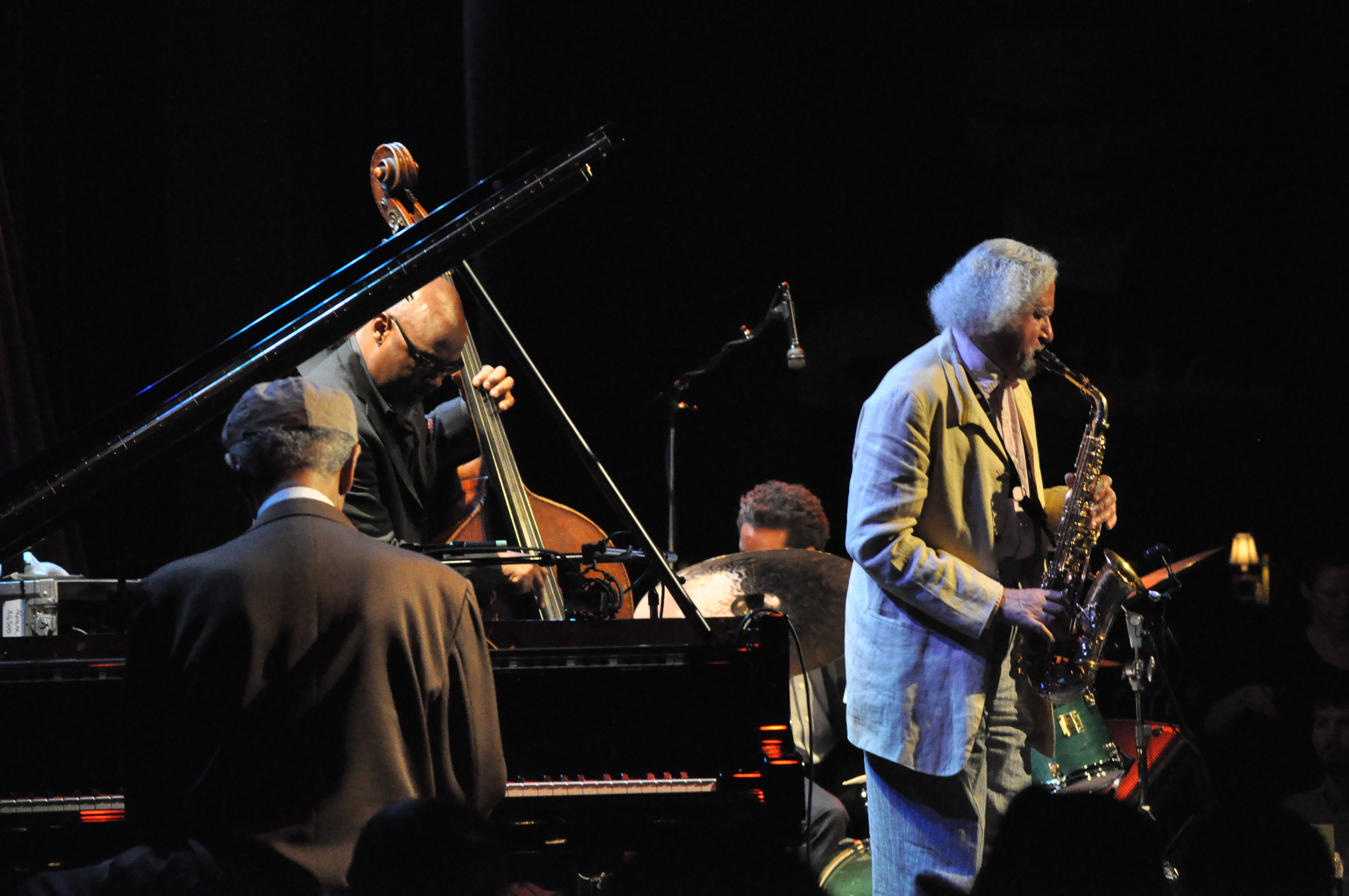Sunday, October 06, 2013
Relishing the tempest: McCoy Tyner at the Blue Note
I saw McCoy Tyner play an extraordinary set at the Blue Note last night, with an extraordinary band. (Go see them tonight—8pm, 10:30pm—if you can.) I'm in my 15th year as a New Yorker, and I'd never heard Tyner live before last night, a fact I can't really excuse. Living here, it's nearly impossible not to take certain legacy artists for granted, but that doesn't make it okay—as a friend I ran into yesterday put it, we do indeed need to see these musicians while we can.
And not just out of some sense of duty or obligation. Because, as I learned last night, sometimes these older players can truly blow your hair back, transcend the mundane, multiset-per-night jazz-club idiom and achieve something otherworldly, dangerous, borderline scary.
I wasn't prepared for Tyner's intensity, nor for his unpredictability. The general framework of the material followed what I think of as a classic Tyner model, known to me via records like Enlightenment (recorded 40 years ago this past summer). It's a sound built on these rolling, cascading vamps, executed at precarious tempos, so that the music takes on the quality of a spiritual quest. This approach scans in my mind as post-Coltrane, but it is literally that, i.e., not as much an aesthetic that Coltrane himself pursued as one popularized by those, such as Tyner and Pharoah Sanders (I think of the vamp section of Pharoah's "Upper Egypt and Lower Egypt") who played with him.
When the band joined up for the opening and closing themes, there was a gorgeously ragged, almost dixieland-ish sound—with saxist Gary Bartz and violinist John Blake Jr. (a new name to me and an outstanding player) keening in the upper register, interweaving their ecstatic cries as Tyner lashed the band on with his rumbling, headlong flow. Bartz's solos were among the rawest I've heard in a jazz club in years. He'd start slowly, inquisitively, and work himself into the realm of expressionism. I don't just mean squeaking and squawking for the sake of it; there was a bit of that kind of abrasiveness, but Bartz's climaxes felt intensely earned, the product of total effort, absolute concentration. As with the rest of the band, there was an engagement, a conviction to his playing that startled me. In general, the pieces (two or three of what I assume were Tyner originals—the vampy selections described above—plus "Moment's Notice" and "In a Mellow Tone," as well as an incredible unaccompanied piano feature) proceeded in an orderly progression of solos, but each musician was so engaged that the format never seemed stale or predictable.
A lot of this had to do with drummer Francisco Mela, who juxtaposes hard-driving flow with turbulent interruption. It's hard not to think of Elvin Jones when you hear his thunderous tom-tom thumps, which egg the band on while simultaneously introducing a sort of random, weather-event chaos. But it was Tyner himself who was the real upsetter. He'd lay out during the beginnings of solos, building dramatic tension, then zoom back in with a flourish—he's a true daredevil, and not sparing with the showboat-ish, one-finger runs down the length of the keyboard—powering the music with a mighty force totally at odds with his frail, 74-year-old frame. Often, the band would lay out in turn during his solos, leaving him to his stormy reveries.
The dynamic range of these passages was enormous. I mentioned weather above in reference to Mela, and that was the prevailing metaphor that kept popping into my head as I listened to Tyner—the man conjures storms as he plays. I've always known him to embody this sort of holy-roller force, but the role he played in the Coltrane band was so oddly thankless at times—i.e., it can often seem to me, in the Classic Quartet context, that his solos are rest stops between the superhuman Coltrane and Elvin clashes; I'm oversimplifying, but his gestures in that group can't help but get swallowed up at times by the maelstrom outside. At the helm of his own band, he embodies this sort of divine will, a mercurial force that ranges from sweet and merciful to scatterbrained and roiling, to downright world-shaking. The band would watch Tyner's solos with a kind of awe; they never seemed to know when (or if) he was going to cue them back in, and both they and the audience seemed to relish that unpredictability.
We were all in the hands of a benevolent wizard, a veteran player intent on, quite literally, moving his audience, by sheer force of will, through both the power he commanded in his hands and the passion in his heart. This was jazz as conjuration—not simply about "swinging," about slickness, but about sending huge boulders of feeling rolling down the mountain, about ensuring that danger and risk took precedence over mere proficiency. There was a seat-of-the-pants quality to this set, a sense of the players constantly overshooting marks and recalibrating, and not caring in the slightest, because that was where the music was leading them. It was the storm and they were the ships, navigating valiantly but also relishing the tempest, inviting it in—as one would a muse—and singing its praises.
/////
Here's a great 2011 clip featuring four fifths of the same band:
Labels:
blue note,
francisco mela,
gary bartz,
john blake jr.,
mccoy tyner
Subscribe to:
Post Comments (Atom)

1 comment:
Great clip, until Jools cuts him short of course. I wonder if Jools would've been so eager to move-on had the artist been more pop orientated? Devils advocate and all that, but he's not known for having many pianists on his show, especially ones younger than himself.
Post a Comment